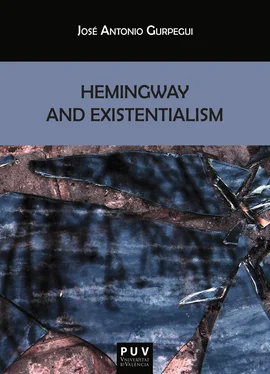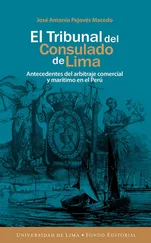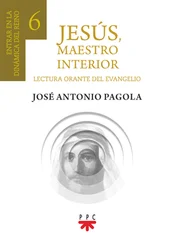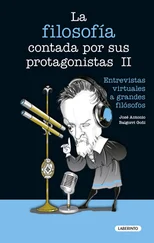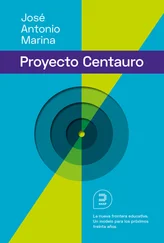Hemingway’s relationship with existentialism even manages to go beyond the exclusively literary field by interesting all sorts of people. Thus, for example, it is possible to mention how some Ministers use said relationship in their Sunday sermon. This is the case of Raymond T. Exum, Minister of the Crystal Lake Church of Christ—Crystal Lake, Illinois—who delivered the sermon entitled “Teaching Morals” on April 27, 1997. That day the parishioners listened to the following words,
Has the United States reached that situation today? Earlier in the twentieth century there was a philosophy known as existentialism. It came from a Danish philosopher named Sören Kierkegaard. I want to read Mr. Kierkegaard’s definition of this new philosophy from his journals. He said, “The thing is to understand myself, to see what God really wishes me to do. The thing is to find a truth which is true for me.” Notice the emphasis there on his feelings about what is right and wrong, not necessarily what God thought about that matter. That statement was the basis for Ernest Hemingway’s statement “Good is what you feel good after doing and bad is what you feel bad after doing.” 14
This one is a clear representation of its generality, since searching for information on Hemingway and existentialism or asserting that Hemingway is an existentialist writer seems excessively superficial if the “type” of existentialism is not distinctly clarified. Existentialist trends are as varied as the number of philosophers that followed the movement. After all, existentialism is not a monolithic system of thought. We can even find antagonistic points of view between the different existentialist philosophers, resulting from the analytical independence of each of them.
One suspects that the use of the terms “existentialism” or “existentialist” nowadays is directly related with the Sartrean vision or approach to the philosophical school—it was Sartre who popularized the term after World War II; however, the evolution from Kierkegaard to the French philosopher is interesting in the substantial aspects of this philosophical thought. Kierkegaard, for example, believed in the existence of God; Sartre, on the other hand, denied it. Not in vain the three most known existentialist philosophers have been categorized as “Christian existentialists” (Kierkegaard 15 ); “agnostic existentialists” (Heidegger) and “atheist existentialists” (Sartre).
Existentialism is usually associated with atheist attitudes. However, there are numerous philosophers who are considered existentialists that develop their theories from religious premises. Kierkegaard has already been mentioned, and closer to the present time it could also be mentioned the German Protestant theologists Paul Tillich, Rudolf Bultmann or Carlos Barth, who links Kierkegaard’s postulates with respect to eternity with Luther’s and Calvin’s theories, starting a reformist movement of theological dialectics; the French Catholic theologist, Gabriel Marcel, who repudiated the expression “existentialist,” precisely for his opposition to Sartre’s atheist approach; the Russian orthodox, Nikolay Berdyayev, who, like Leon Chestoff, worried about the spiritual manifestations of the soul from the inherent beginnings to orthodox Christianism; the Italians, Armando Carlini and Augusto Guzzo, and the most popular Italian existentialist, Nicolas Abbagnano, supporters of Christian existentialism; or the German Jew, Martin Buber.
Therefore, it is necessary to clearly put forward the basis of existentialism and its later derivations, with the purpose of establishing the theoretical frame in which it will be developed and base the line of argument here exposed when relating Hemingway to existentialism.
Theoreticians of the movement have seen existentialist signs in the “Old Testament” 16 and also in certain Socratic 17 postulates. However, it was the French philosopher, Blaise Pascal, the one who in the 17 thcentury anticipated the conceptual beginnings of modern existentialism. Pascal opposed the rigorous rationalism of his contemporary René Descartes, and in his Pensées he had already dealt in depth with the “paradox” of human existence, for, to simplify, man is a combination of body and mind, which on its own is paradoxical and contradictory.
These are the precedents, although true existentialism—or “modern existentialism” as numerous critics like to call it—arises with the Danish philosopher Sören Kierkegaard.
In the same manner that Pascal questioned Descartes’ principles, Kierkegaard opposed Hegel’s philosophy. The Dane emphasized human liberty, without showing special interest for the universally accepted truths that interested the German. Kierkegaard theorized about the relative truths exclusive to the individual which were the cause for personal decisions; that is, he was interested in “existential truths.” The turning point of existentialism with respect to the philosophical theories of the 19 thcentury, still inherited from the transformation that arose in the Modern Era, has to do with the substitution of the universalist conception that deals with the afterlife, which would represent a spiritual attitude, for a more partial vision that is fundamentally oriented to life on earth, an existential attitude. He proposed a substantial alteration of the gnoseological (of knowledge) and axiological (of values) order.
Like Pascal, Kierkegaard also understands man’s life as a continuous paradox and infers, as Eduardo Nicol states, (208), that “la existencia es para el hombre posibilidad, y que las decisiones que se toman son las que forman y transforman efectivamente nuestro ser. Hacerse a sí mismo es la tarea propia del hombre en su existencia” (142; footnote 28). 18
This represents the essence that unifies the theories of existentialist philosophers. Each and every one of the books and treaties about existentialism emphasize the numerous, and in some cases fundamental, discrepancies between the different philosophers of the movement; and, at the same time, recognize that all of them converge in their conception of the individual as a free person who is continuously facing the difficult and distressing need to choose. Jaspers and Sartre present diverging existential models, although their opinions are identical with respect to human liberty.
The Enlightenment, which at its time opposed the theoretical conception of the world and society, centered its attention in obtaining “rational ideas” to understand the universal and the essential in a rational and empirical way so that a nexus could be established between reason and nature. It was basically a broader vision that was not interested in specific or individual subjects, precisely those which were truly important for existentialists. Moreover, the understood belief that man was a harmoniously integrated being in the universe that lived with security in this world and who would become a kind of “heaven on earth” thanks to technique and science, had been crushed due to the recent historical events brought by the war. According to the existentialists, it was a fallacy to believe in universal kindness because this way they would loose sight of the enigmatic and disturbing of our existence. Lastly, it was a mistake to consider that man did not have spiritual autonomy and self responsibility in favor of the masses, of the general benefit. The optimistic proclamations of the Enlightenment and Hegel’s absolutistic pantheism were at all costs inefficient for the 20 thcentury man.
Martin Heidegger understood it as such. He returned to Kierkegaard’s philosophical theories—until then practically unknown—and took them one step further when asserting that “being” and “existing” were the same, and that “being in the world” is the same as “coexisting with others.” Besides, existence comes from nothing, and that is where it heads to. Man would finally be a “being for death” ( Sein-zum-Tode ). As his predecessors Pascal and Kierkegaard, Heidegger also structures his philosophical thought as an answer to another philosopher’s rationalism, in this case his old professor Edmund Husserl. The founder of the phenomenological philosophy wanted, in a certain way as Descartes and Hegel, to establish a “method”—as he called it—as scientific as possible to describe and analyze human consciousness in order to resolve, if possible, the contradiction between empiricism and rationalism .Phenomenological idealism, or if preferred “phenomenological method”—followed by thinkers of great stature like Pfänder, Geiger, or Farber, among others—establishes a distinction between what is called “science of fact,” empiricism, and “science of essence,” eidetics, assuming that philosophy can reach the same level as science. Heidegger, on the other hand, presupposes that man moves on earth as incomprehensible as indifferent and that any intent or hope to understand the reason of our earthly existence seems useless and is inevitably doomed to failure. Lastly, man sees the need to “set a goal” and tries to reach his objective with dedication, despite knowing the inevitability of death, the intranscendency of life, and the inexistence of a spiritual life after the earthly life. Nietzsche has been unjustly accused of “killing God” because existentialist philosophers with similar thoughts 19 have demonstrated that he only wrote his elegy, and Heidegger was its executer.
Читать дальше
